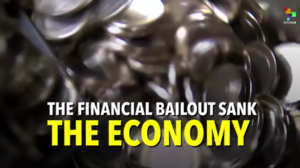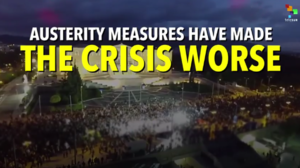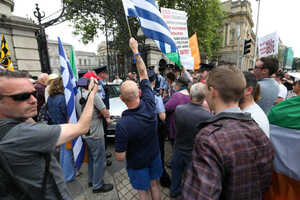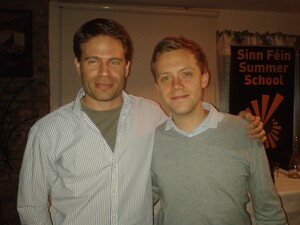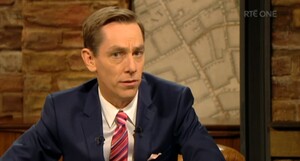

From top: At the 2016 National Economic Dialogue in Dublin Castle were from left: then Minister for Finance Michael Noonan , ESRI Chairman Alan Barrett, then Minister for Social Protection Leo Varadkar and then Minister for Public Expenditure and Reform Paschal Donohoe; Eamonn Kelly
What if austerity was a scam? What if austerity was to the 2008 financial crisis what the Patriot Act was to 9/11?
What if the same right-wing types with an eye for an opportunity to impose more control over their populations also acted in the wake of the financial crisis to seize the opportunity to roll back the welfare state?
These are thoughts that come to mind when engaging with the ideas about money and austerity put forward by Professor Emeritus Mary Mellor, from the University of Northumbria in her book “Money: Myths, truths and alternatives.”
Ten years on from austerity and it’s not really any better at the bottom, but it seems to be okay enough at the top.
More than okay. In fact, in terms of property speculation there’s a bit of a Klondike goldrush taking place in Ireland, particularly in Dublin.
According to Mary Mellor, austerity was based on not just one myth, but two: “that the market is the sole source of funding for public spending and this must be limited because money is in short supply. Neither is true…” writes Mellor.
In the model that we all know and suffer beneath, the market, run by rich tax-free wise men creating “jobs”; generates rivers of money which creates a reserve for taxation, which is then collected and goes into a kind of communal kitty to fund public spending.
But maybe this is not the way it works at all.
Austerity, according to Mellor, was justified on the basis of society being a kind of family, with the government acting as the frugal mother, and the private sector the breadwinner – an arrangement Mellor calls, “handbag economics”.
Everyone else is the “kids” who have been “bold” during the boom, spending too much and now they have to pay for that in pocket-money cutbacks.
In this scenario, austerity is like being grounded by stern but good parents eager to deliver a life lesson in how to behave responsibly with money.
In “handbag economics”, only the market creates money. The “daddy”, in other words. The patriarch, out winning the bacon in the big cruel world to feed a brood of ungrateful and greedy children who must be slapped into line from time to time.
Austerity is being slapped into line by stern “daddy”.
Mellor writes:
“Money is to be generated only through market activity and any request for increased public expenditure is almost invariably met with the response ‘where’s the money to come from’? Or as Theresa May put it – there is no ‘magic money tree’…”
This money tree argument, by the way, is always the first obstacle to any discussion about basic income, which is then characterised as hopelessly impractical pie-in-the-sky thinking, despite the millions flushed down the toilets of the likes of Seetec and Turas Nua in hopeless employment activation schemes.
But according to Mellor, not only is there a magic money tree – and I have a suspicion that those at the top know this – but there are actually two magic money trees.
She writes:
“Both the state and the market create money – that is they can increase and decrease the money supply by their activities. Markets increase the money supply when banks lend and decrease it as loans are repaid. States increase the money supply when they spend, and decrease it when they tax….”
She goes on to say that handbag economics assumes that taxation of income generated by the private sector funds the public sector, money flowing from private to public.
Which is the argument for tax-free wealthy people who are assumed to be creating the money that keeps the public sector in gravy.
But Mellor argues that the flow of money can also go in the opposite direction, from public to private.
If taxation is taking money out of people’s pockets, public spending is putting money back into people’s pockets. Governments, like banks, can, if they so wish, create money out of “thin air”.
Banks do it by setting up bank accounts. States do it by allocating budgets.
Mellor writes:
“When governments set budgets they do not draw money from a taxation ‘piggybank’ any more than banks raid deposit accounts. The budget allocates spending commitments that may, or may not, match the amount of money coming in through taxation. Public budgets put money in the pockets of individuals and organisations, taxation takes that money back. It is not tax that creates the money for the public to spend, it is public spending that creates the money to tax….”
Viewed this way, the entire austerity project can be seen then as facilitating the transfer of wealth from the public to the private and putting nothing back. The parallels with the right-wing view towards natural resources and climate damage are striking.
Leo Varadkar’s stubborn unwillingness to provide social housing, resulting in over 10,000 homeless people, can be seen as a by-product of this transfer of wealth from the public to the private, with no effort made on any level to put anything back, apart from the insulting and humiliating provision of soup kitchens and sleeping bags.
The engineers of this transfer of wealth from the public to the private, basically Fine Gael facilitated by Fianna Fail, are commonly regarded by an often-obsequious mainstream media as “incompetent”. But maybe that judgement is missing the point.
Maybe they are being very clever in that Irish way of being very clever that necessitates being perceived as “stupid” and incompetent.
Meanwhile, the transfer of wealth from the public to the private continues unabated, while everyone wrangles about the “outrageous” incompetence of the governing parties.
Eamonn Kelly is a freelance Writer and Playwright.
Rollingnews





